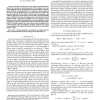Free Online Productivity Tools
i2Speak
i2Symbol
i2OCR
iTex2Img
iWeb2Print
iWeb2Shot
i2Type
iPdf2Split
iPdf2Merge
i2Bopomofo
i2Arabic
i2Style
i2Image
i2PDF
iLatex2Rtf
Sci2ools
TIT
2008
2008
On Low-Complexity Maximum-Likelihood Decoding of Convolutional Codes
Abstract--This letter considers the average complexity of maximum-likelihood (ML) decoding of convolutional codes. ML decoding can be modeled as finding the most probable path taken through a Markov graph. Integrated with the Viterbi algorithm (VA), complexity reduction methods often use the sum log likelihood (SLL) of a Markov path as a bound to disprove the optimality of other Markov path sets and to consequently avoid exhaustive path search. In this letter, it is shown that SLL-based optimality tests are inefficient if one fixes the coding memory and takes the codeword length to infinity. Alternatively, optimality of a source symbol at a given time index can be testified using bounds derived from log likelihoods of the neighboring symbols. It is demonstrated that such neighboring log likelihood (NLL)-based optimality tests, whose efficiency does not depend on the codeword length, can bring significant complexity reduction. The results are generalized to ML sequence detection in a cl...
Related Content
| Added | 15 Dec 2010 |
| Updated | 15 Dec 2010 |
| Type | Journal |
| Year | 2008 |
| Where | TIT |
| Authors | Jie Luo |
Comments (0)

